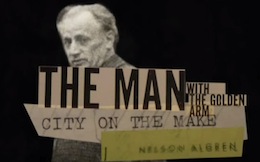Is this Nelson Algren’s moment? If it is, I don’t think he’d give a damn — not personally — considering he’s gone and how long ago that was. I also don’t think he’d appreciate what has become a cliché of the Algren myth — the forgotten writer. Sure, he’s forgotten. Most writers are. And of those who are remembered, many are less worthy than Algren. But let’s not forget that in his time he had moments of glory that even the worthiest writers may never have.
 Maybe the cliché will be retired at least for a little while with the premiere of “Algren,” which opens today at the 50th annual Chicago International Film Festival. It’s a new documentary written and directed by Michael Caplan — five years in the making and the product of “blood, sweat, love, and money,” he says. More a fact-filled eulogy than a probing documentary (I hope that’s not an unfair description), it is expertly made — the seamless editing in particular is superb; so is the incidental music — and it floats on a raft of brilliant Algren quotes, all smartly chosen and nicely tied together, along with some great audio finds of Algren speaking in his own voice.
Maybe the cliché will be retired at least for a little while with the premiere of “Algren,” which opens today at the 50th annual Chicago International Film Festival. It’s a new documentary written and directed by Michael Caplan — five years in the making and the product of “blood, sweat, love, and money,” he says. More a fact-filled eulogy than a probing documentary (I hope that’s not an unfair description), it is expertly made — the seamless editing in particular is superb; so is the incidental music — and it floats on a raft of brilliant Algren quotes, all smartly chosen and nicely tied together, along with some great audio finds of Algren speaking in his own voice.
Of course you can’t go wrong quoting Algren. The man wrote like nobody else. It wasn’t just the conviction of his beliefs and the grace of his prose that made him unique. It was his personality, a mix of high intelligence and sharp humor combined with tragic depths of feeling, that seeped into his writing like an indelible stain. All of that is on full display in Caplan’s movie, along with demonstrations of Algren’s ear for vernacular speech, his appreciation for what makes people tick, and his critique of a society that he depicted as rotten at the core.
For me the best part of Caplan’s movie was hearing Algren speak about his work and read from his books in his own voice better than I’d ever heard him before. As Hunter S. Thompson once put it in a letter, which the movie cites: “Dear Mr. Algren, I am about finished with a book about the hells angels … and I find I have injected a large part of the opening of ‘A Walk on the Wild Side’ … The stuff is too good to paraphrase …”
I also got a kick out of listening to the movie’s talking heads. There are lots of them. Suzanne McNear, for instance, whose endearing description of Algren as “a real troublemaker” — a sort of Dennis the Menace in private — catches him exactly. As does her more serious point about Algren the writer: “It wasn’t just that he was interested in down and out people. He thought the whole country was unfair and that so many people had so little.” And I appreciated Bill Savage’s literary remarks. When he says Algren’s fiction “always deals with people who otherwise would not have a voice” that pretty much sums up all of Algren’s fiction and most of his nonfiction.
Full disclosure: I knew Algren. I’m one of the film’s talking heads. Caplan wrote me the other day, the first time we’d been in touch in years: “Your interview in 2009 was incredibly detailed and enabled us to find a clear story, distinct from the Bettina Drew biography. It wasn’t planned, but you are one of the few people whose interview is in the movie throughout the story, from Algren’s youth to his demise. Also, your copy of Wolf’s film was also critical — in fact, we ended up sending a DVD of the film to Wolf because he didn’t have a copy himself!” Well, thank you.
Caplan exploits the German writer-director Wolf Wondratschek’s footage — flawlessly, I would add — to give Algren’s take on the sad plight of that meek literary species “the American writer” and to exhibit Algren’s frustration with all the attention that’s been paid to his once-upon-a-time romance with Simone de Beauvoir. But just to be emphatically clear, “Algren” tells Algren’s story as Caplan sees it, not necessarily as I see it. Which brings me to what I consider the soft center of the flick: the Algren-Beauvoir affair. The film harps on it — entertainingly, I admit, but to a degree that becomes redundant. I guess when you find great vintage newsreel footage from 1947 about the existential French philosopher girlfriend of the even more famous existential French philosopher Jean-Paul Sartre taking up with Algren you just can’t let it go. (The stentorian newsreel voice announces with earth-shaking importance: “SIMONE HAS FOUND HERSELF AN AMERICAN LOVER!”) And when you have Art Shay (the photographer/writer whose photos are the visual backbone of the entire film) available to talk about what Algren in the old days told him of the love affair and what he witnessed himself through his camera lens, I suppose that harping on the subject is unavoidable. But I’ll give Caplan this: He shows a sense of humor. He injects a bit of cartoon animation into his treatment of the romance and offers as a capper Studs Terkel’s remark about the affair: “I knew she was in love with him because she laughed at all his jokes and didn’t understand one.” I have one other bone to pick with the film. Where is Steve Deutch, who was Algren’s most intimate friend for the last 20 years or so of his life, closer probably than even Studs Terkel or Roger Groening, another of Algren’s longtime friends who appears in the film. In a tribute to Algren that includes dozens of people who knew him — among them the directors William Friedkin, Philip Kaufman, the writers Bruce Jay Friedman, Russell Banks, Rick Kogan, and Joe Pintauro — and many others who didn’t know him but admired him from a distance, like the writer-director John Sayles, the memoirist Stephen Elliott, and the Smashing Pumpkins’s Billy Corgan, wasn’t there room for Deutch? It’s a glaring omission and for me a major disappointment. I was close to Steve, closer than I was to Nelson, so I suppose I’m taking it personally.Therefore let me offer a remedy with this clip of Steve talking about Nelson’s funeral. It was posted online by Mark Blottner, Denis Mueller, and Ilko Davidov, who are making their own Algren documentary, titled “The End Is Nothing, The Road Is All.” The title is taken from the great epitaph on Algren’s gravestone. (The words were chosen for him by Candida Donadio, Algren’s loyal old friend and literary agent, as I’ve described in Ticket to New Jersey ).
And just for the record, here’s a clip about the “The End Is Nothing, The Road Is All,” which looks to me like it will be a grittier sort of documentary.
Finally, what I’m really waiting for is the literary biography that Colin Asher is currently writing about Algren. I’m betting it will be gritty and sensitive both, and will give us a fully alive, deeply researched portrait that will change our understanding of the man. When it’s published in a couple of years by W.W.Norton, I expect that to be the ultimate Algren moment.
UPDATE: Oct. 13 — Posted today in The Columbia Chronicle: “Neglected author takes ‘A Walk on the Wild Side’ onto the silver screen”



